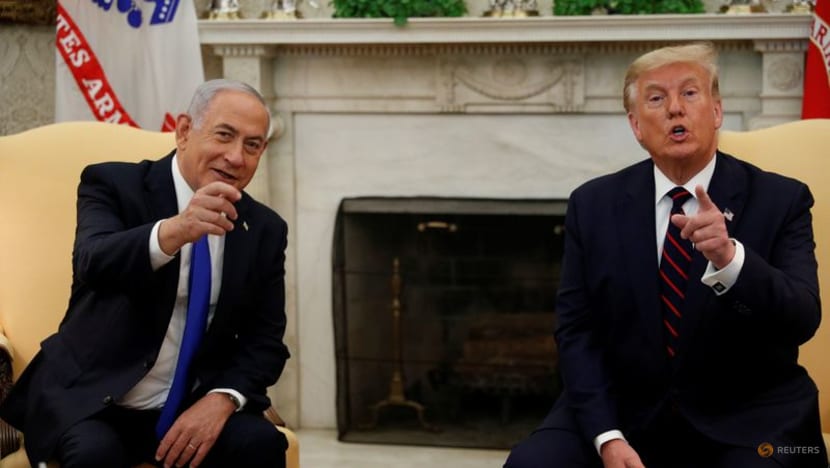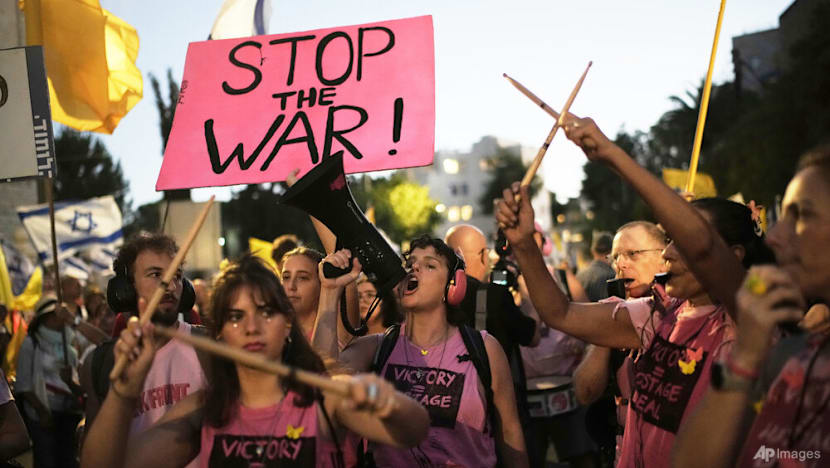Netanyahu to meet Trump as Israel faces isolation over Gaza war

Israel's Prime Minister Benjamin Netanyahu meets with US President Donald Trump before signing the Abraham Accords, in Washington, US on Sep 15, 2020. (File photo: REUTERS/Tom Brenner)
JERUSALEM: Facing growing isolation abroad and mounting pressure at home, Israeli Prime Minister Benjamin Netanyahu will defend his intention to "finish the job" in Gaza when he meets US President Donald Trump on Monday (Sep 29).
The meeting comes days after Trump unveiled a 21-point plan aimed at ending the war in the Palestinian territory during discussions with Arab and Muslim leaders on the sidelines of the United Nations General Assembly.
On Sunday, Trump hinted at "something special" to come in Middle East talks, posting on his Truth Social platform: "WE WILL GET IT DONE!!!"
On Friday, he told reporters in Washington: "I think we have a deal" on Gaza, even as Netanyahu vowed at the UN to continue the military campaign until Hamas was defeated.
EXPERTS SAY NETANYAHU IS CORNERED
Analysts say Netanyahu has little room to manoeuvre given that Trump has remained almost his only ally in the international community.
"He has no other choice but to accept," said Eytan Gilboa, an expert on US-Israel relations at Israel's Bar-Ilan University.
In Israel, tens of thousands of protesters have pressed for a ceasefire. On Saturday, relatives of hostages called on Trump to use his influence.
"The only thing that can stop the slide into the abyss is a full, comprehensive agreement that ends the war and brings all the hostages and the soldiers home," said Lishay Miran-Lavi, whose husband Omri remains captive in Gaza.

ISOLATION DEEPENS
Israel's international isolation has widened, with the United Kingdom, France, Canada and Australia among those that have officially recognised Palestinian statehood.
Trump's 21-point plan, according to a diplomatic source, envisions a permanent ceasefire, the release of hostages, an Israeli withdrawal from Gaza and a major influx of humanitarian aid. Arab and Muslim leaders have welcomed the framework but continue to press for an immediate halt to Israel's military operations and any occupation of Gaza.
Other elements could prove difficult for Netanyahu to accept, including a role for the Ramallah-based Palestinian Authority (PA) in future governance of Gaza. The PA ruled the territory until Hamas seized power in 2007, and its restoration represents a red line for Netanyahu's far-right coalition partners.
DOMESTIC POLITICAL RISKS
Several ministers have threatened to quit the government if Netanyahu agrees to the PA's return or ends the war without defeating Hamas.
Opposition leader Yair Lapid has offered his centrist Yesh Atid party as a parliamentary "safety net" to back a ceasefire and hostage deal, though it is unclear whether other opposition parties would join.
"This kind of broad plan would need a broad consensus," said Ksenia Svetlova, a former Knesset member now leading the NGO ROPES. She predicted Netanyahu would try to accept only parts of the deal and postpone decisions on the most contentious elements.
SECURITY QUESTIONS REMAIN
Another sticking point is who would guarantee security in Gaza once Israel withdraws and Hamas is disarmed.
The US plan envisions an international force combining Palestinian personnel with troops from Arab and Muslim countries. But details about command structure and operational control remain unresolved.
"This plan is internationalising the Gaza conflict in an unprecedented way," Svetlova said. "But without a clear guiding star, without clear goals and accountability, the unpredictability factor runs wild."














